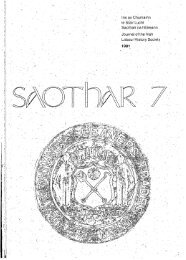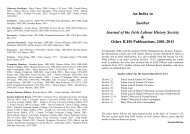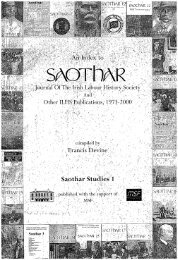94 SAOTHAR.13,"defending the view that 'a person had a right to private property', the Glasgow Observer also deploredthe ILP' s doctrine that 'religion must be banned from the schools'. Unlike private property in the meansof production, land could be nationalised because it 'had not been made by man but by God Almighty'.While complaining that 'some of our Catholic young men have been so far misled as to become incertain localities members of the local branches of the ILP', the priests were really admitting that theyhad unleashed forces they could no longer control. 39Yet despite Irish-Catholic attempts to integrate themselves into the Scottish labour movement bydeveloping a double-identity, some of their leading figures and supporters were kept out of prominencethrough ethnic and religious prejudices. Orangeism remained a decisive and devisive influence. KeirHardie was,for example,believed to harbour anti-Catholic prejudices; and Hardie's gaffe in 1879 incomparing Alexander MacDonald with Martin Luther before an audience of mainly Catholic minerskept this belief, whether justified or not, alive for a long time afterwards.Robert Smillie was known to express Orange sympathies; 4 °and Chisholm Robertson, 'the mostgifted speaker' in the early Scottish labour movement, was driven outof the miners' union in 1900 afterengaging in bitter quarrels with Smillie and Hardie. 41 Bob Selkirk, the veteran communist, insisted thatSmillie's Orangeism played a crucial role in the demise of both Chisholm Robertson and WilliamSmall. B ut in contrast to Chisholm Robertson, Small remained a Marxian socialist as well as a Catholic.'Artdrew McCowie, William Small, Chisholm Robertson, John Leslie and James Connolly werepractising Catholics as well as active socialists.While James ConnoUy's relationship to Catholicism was always very complex, he was, at leastaccording to Harry McShane, always very touchy when John Maclean and others criticised the CatholicChurch. Although Connolly privately informed Matheson in 1908 that he had not been to his religiousduties for fifteen years, he was criticised by American socialists in 1905 for attending Church. Just asRalph Chaplin said that Connolly at this time 'spoke too much like an Irish nationalist to suit me', soHenry Kuhn, an American De Leonite, complained abut his pro-Catholic sympathies. 42In making a perceptive critique of Walter Kendall's argument that the doctrinal purity of the DeLeonite Socialist Labour Party (SLP) in Scotland could be attributed to the Calvinist background of itsfounders, George Monies said: 'This seems to be a superficial explanation of the nature of the SLP sinceCalvinism is basically elitist, many of the Scottish SLP were Irish Catholics and it does not explain whythe SLP gained members outside of Scotland'.43 The important pioneering role of the comparativelyunknown Irish-Catholic immigrants in the SDF and SLP as well as in the ILP deserves recognition. Butthe really crucial point is that the collective social being of Irish-Catholics in Scotland between 1880and 1926 produced a distinctive common cultural life in the conclaves where they gathered togetherin the Scottish labour movement.In this specific sense the social being of Chisholm Robertson, Andrew McCowie, John Leslie, J.Shaw MaxweU, Jaines ConnoUy, Patrick MacGill and many others engendered their own distinctivecultural life. By 1909 Patrick MacGill was an active member of the Greenock branch of the SDF. Withthe assistance of Maclean he published his first book in 1911. Despite Maclean' s intense hatred of theCatholic Church, he tried to encourage and foster MacGill' s literary talent as part of a general endeavourto spread socialist enlightenment. Even sO,Maclean was distressed by the fact that MacGill wassympathetic to the Catholic Church.44 But although MacGill was active in the Marxist SDF, he wasvery aware of and portrayed the distinctive way-of-life of the Irish immigrants in Scotland.The tensions were never one-sided. In attempting to promote MacGill's first book in the' pages ofForward. MacLean articulated a strong anti-Catholicism; and he was, as Harry McShane says,'opposed to the Catholic Church in a Calvinist way as well as in a Marxist way' .45 In a later, thoughsomewhat different, version of the same story, Tom Bell said that Connolly 'related stories of workersin the Irish Socialist Republican Party going to mass of a morning and delivering the Irish Worker atthe houses on the road' . In insisting that Connolly denounced the Catholic Church, Bell said that henevertheless made it clear 'he was a Catholic'.46 On the other hand, Harry McShane says that Connollywas not prepared to tolerate any criticism of the Catholic Church.47
:. -,,'.' ',. .~.,:.ESSAYS 95Although the Catholic Socialist Society was founded in Glasgow by John Wheatley and WilliamRegan, it attracted as much sympathetic publicity in the American as in the Scottish socialist press. 48In reconstructing the Scottish context, RaphaelSamuel says: 'Scottish socialism in this period seemsto have been particularly militant in its atheism, and for many of those who came to it - whether throughthe !LP, the SDF orthe SLP - religion and the Church were (as Tom Bell recalls) 'the big enemy". Thepolitical attitudes of Wheatley and Regan were made crystal-clear in a letter that Regan sent to CarlThompson, the Secretary of the American Socialist Party in July 1914:'One piece of advice I would venture to o.ur American comrades, .Do not meet the Catholic attack by acounter attack on the priests and the Church. That may be the temptmg way, but that way lies failure. TheCatholic workingman will not be attracted to you when you attack institutions he holds dear. '49In glancing back to the growth of the labour movement in Scotland before the First World War,David Lowe argued that 'the appearance of the Catholic Socialist Societies' was 'altogether inspiring'in so far as the Irish immigrants had become less hostile to organised labour' .50 IfConnolly, ChisholmRobertson, John Leslie and others had not previously developed a dual-identity as Irish patriots andScottish citizens, the Catholic Socialist organisations would not have found the space in which theycould grow and flourish. In acknow ledging Connoll y' s dual-identity, Owen Dudley Ed wards said: 'Hewas an Irishman, and we rightly claim him as ours; but he was born in Edinburgh, and the magnitudeand pain of his struggle there gave him every right to Scottish nationality also' .51 But the forcesunleashed by the First World War played a contradictory role in the history of the Irish in Scotland.While the Easter Rising in 1916 created the pre-conditions in which a mass Labour vote could developamongst the Irish immigrants, the execution of Connolly initially re-kindled sectarian strife in someScottish working class communities. 52In depicting the impact of the Easter Rising on the Fife coalfield, Bob Selkirk wrote: 'Widespreadanger at the cowardly shooting of Connolly, the wounded leader of the 1916 Irish uprising, intenseindignation at the tactics of the Black and Tans in Ireland, a big sale of Connolly's pamphlets, madeit inevitable that 'help' should be organised for the Sinn Feiners and their tactics imitated under differentconditions'. In reinforcing what Selkirk said, John McArthur gave a similar account: 'We took a closeinterest in the Irish struggle. There were quite a number of Irish militants in Fife with whom we had theclosest association because in those days Irishmen were expected to be' agin the Government' and forthe trade union and labour movement' .53In 1921 Sinn Feiners in Fife started a series of 'farm fires'. When the culprits were charged in theDunfermline Sheriff Court, a sympathiser' called upon them to keep 'the Red Flag flying' '. Some Irishimmigrants joined the Comm unist Party in Fife, Glasgow, Edinburgh and elsewhere, and the Sinn Hin,organisation in Fife co-operated with the. local communists during the bitter coal strike of 1921. An. editorial in the conservative D unfermline Journal asserted that: 'A plot to establish a ScottishCommunist Republic was seriously projected, while the Scots were referred to in a leaflet as 'bloodytools of the English against our brother Celts of Erin'. A week later the editor said:'In Fife the revolutionary spirit is widespread and it would be dangerous to minimise it. Extreme socialismas known in 1914, has given place to communism, and Irishmen have been swept into Sinn Feinism ...Reviewing the incidents of the last fourteen days, when at times mob rule ruled supreme, conclusions areaccepted indicating that had the authorities not acted with promptitude Fife would ere now have been ina rebellious state. '54Although the aggressiveness amongst the Irish immigrants in places like Fife gave a new impetusto Orangeism, the growth of a mass Labour vote could not bestopped. The fact that many of the IrishCatholics in the Gorbals constituency voted for George Bames, a right -wing leader of the Labour Party,rather than John Maclean, the friend of Connolly, in the'general election of 1918 was not decisive
- Page 1 and 2:
JOURNAL OF THE IRISH LABOUR HISTORY
- Page 3 and 4:
ContentsPageEditorial: Labour Histo
- Page 5 and 6:
EDITORIAL 3freedom to participate i
- Page 7 and 8:
CorrespondenceThe Irish Labour Part
- Page 9 and 10:
; ~ ; ,The Decline and Fall of Donn
- Page 11 and 12:
THE DECLINE AND FALL OF DONNYBROOK
- Page 13 and 14:
THE DECLINE AND FALL OF DONNYBROOK
- Page 15 and 16:
·' THE DECLINE AND FALL OF DONNYBR
- Page 17 and 18:
THE DECLINE AND FALL OF DONNYBROOK
- Page 19 and 20:
THE DECLINE AND FALL OF DONNYBROOK
- Page 21 and 22:
THE DECLINE AND FALL OF DONNYBROOK
- Page 23 and 24:
THE DECLINE AND FALL OF DONNYBROOK
- Page 25 and 26:
,'-,;-''''.A PASSAGE TO BRITAIN 23C
- Page 27 and 28:
A PASSAGE TO BRITAIN 25only in the
- Page 29 and 30:
A PASSAGE TO BRITAIN 27clothing._De
- Page 31 and 32:
A PASSAGE TO BRITAIN 29established
- Page 33 and 34:
;:-.",.- .. .", ...... '.:. '
- Page 35 and 36:
LOUIE BENNETI 33feminist movement w
- Page 37 and 38:
:... ~: ."
- Page 39 and 40:
-.- '.LOUlE BENNETT 37While there i
- Page 41 and 42:
LOUIE ~ENNEIT 39Xl's encyclical Qua
- Page 43 and 44:
LOUIE BENNEIT 41Bennett's own relat
- Page 45 and 46: LODIE BENNETT 43109; IWWU resolutio
- Page 47 and 48: Essays in ReviewCosherers, Wanderer
- Page 49 and 50: ••• .".'. >. '~"ESSA YS IN RE
- Page 51 and 52: ESSAYS IN REVIEW 49ConnolIy:Myth an
- Page 53 and 54: ESSAYS IN ~EVIEW 51tion' in the Int
- Page 55 and 56: ESSAYS IN REVIEW53International:'I
- Page 57 and 58: REVIEWScontroversy is real history.
- Page 59 and 60: REVIEWSJoe Monks was among the earl
- Page 61 and 62: REVIEWSnolly-Column Song','Proudly
- Page 63 and 64: REVIEWSresulting from the arrival o
- Page 65 and 66: REVIEWS,63the book by means of an a
- Page 67 and 68: REVIEWSlogue, it is hardly surprisi
- Page 69 and 70: The Team For All Workers ...CULIAIB
- Page 71 and 72: ESSAYS 69mission and moral refonn.l
- Page 73 and 74: .. ...... ~.~ -~ .'- '.ESSAYS. 71fr
- Page 75 and 76: ESSAYS 73claimed authority but whic
- Page 77 and 78: ESSAYS 75provided the basis for soc
- Page 79 and 80: ESSAYS 779. For comparisons see E.T
- Page 81 and 82: ESSAYS 7952. Annals of Christ Churc
- Page 83 and 84: ESSAYS' 81Fianna Fail and the Worki
- Page 85 and 86: ESSAYS 83Eireann in 1925 visibly di
- Page 87 and 88: ESSAYS 85recognition of the impract
- Page 89 and 90: ESSAYS 871970, it created the condi
- Page 91 and 92: ESSAYS89The Irish Immigrants' Contr
- Page 93 and 94: ESSAYS" 91Although anti -Catholic p
- Page 95: ESSAYS 93McCowie played a key role
- Page 99 and 100: ESSAYS 97young girl of their own ba
- Page 101 and 102: SourcesIrish Labour History Society
- Page 103 and 104: SOURCES 101INovember, 1971 to no. 1
- Page 105 and 106: SOURCES 103would claim credit for t
- Page 107 and 108: SOURCES105Sources for Irish Labour
- Page 109 and 110: SOURCES 107NorthWest Archives and L
- Page 111 and 112: SOURCES 109In 1966 the Finnish gove
- Page 113 and 114: TURNINGANEWLEAFThe CPSSUis the larg
- Page 115 and 116: REMINISCENCE 113us due to my politi
- Page 117 and 118: REMINISCENCE 115when Jim was presen
- Page 119 and 120: REMINISCENCE 117of Dail Eireann. 17
- Page 121 and 122: REMINISCENCE 119NotesThe above arti
- Page 123 and 124: DOCUMENT STUDY 121James Connolly in
- Page 125 and 126: DOCUMENT STUDY123SOCIAL DEMOCRATIC
- Page 127 and 128: DOCUMENT STUDY 125proletariat of th
- Page 129 and 130: DOCUMENT STUDY 127the support of Je
- Page 131 and 132: DOCUMENT STUDY 12926. The Workers'
- Page 133 and 134: 131BibliographyA Bibliography of Ir
- Page 135 and 136: BIBLIOGRAPHY 133Compton, P.A. Demog
- Page 137 and 138: BIBLIOGRAPHY 135Levine, I. and Madd
- Page 139 and 140: BIBLIOGRAPHY 137Turner, M. 'Towards
- Page 141 and 142: BIBLIOGRAPHY 1394. Land and Agricul
- Page 143 and 144: BIBLIOGRAPHY 141Clogher Record12 (2
- Page 145 and 146: BIBLIOGRAPHY 143Political Research
- Page 147 and 148:
BIBLIOGRAPHY 145Pres, 1987.O'Brien,
- Page 149 and 150:
147Notes on Contributorsf onathanBe
- Page 151 and 152:
1901: Ireland's first general union
- Page 153 and 154:
ELECTRICAL TRADES UNION .Establishe





